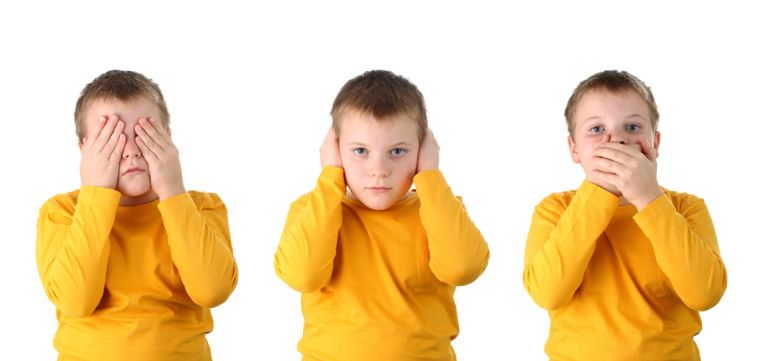
How do children learn values and good habits?
In This Lesson

How can schools teach good behavior?
How can schools teach good behavior?
How do kids learn good study habits?
How can kids learn to deal with conflict?
What is positive coaching?
How can students learn "soft skills?"
▶ Watch the video summary
★ Discussion Guide
Although parents have the primary role in most kids' character development, schools play an essential role, too.
In most schools, the concept of values and habits tend to be lumped together under the broad umbrella of character education, a term that can refer to a host of values and attitudes: respect, trust, honesty, concern for the welfare of others, responsibility, and the desire to do one’s best. Schools with a religious mission include additional values or norms aligned with a belief system.
Some schools incorporate character education into the way they operate rather making it a separate academic subject. A science teacher, for example, can stress the importance of precision and truth when reporting data. A language arts instructor can examine racism by assigning students to read and discuss a novel such as To Kill a Mockingbird.
For many students, experiences in sports are thick with life lessons: how to celebrate a victory, cope with a loss, follow (or break) rules, deal with injury or aggression, and more. These lessons aren't always clear or positive ones, and a lot depends on the culture of the competition. The Positive Coaching Alliance, a California-based non-profit organization, trains parents and coaches to maximize the good stuff and train away the bad stuff.
Making character education intentional
Character education is not part of Common Core standards. It's important anyway.
In many schools, leaders work to make character education an intentional part of what is taught, using messages, slogans and stories. Notably, though, character education is not an official part of California's education standards. Character education programs can differ greatly from one another. They can be hard to measure, and quantitative research on their effects can show mixed results. If your school or district is considering a program, have a look at the federal What Works Clearinghouse for inspiration, as well as the California Department of Education's summary of character education resources.
Another good source of inspiration is the Character Education Partnership, which suggests 11 principles of effective character education. Then again, maybe you'll resonate with the perspective of education writer Alfie Kohn, who views these programs as "tantamount to indoctrination" and offers his own prescription.
Some schools emphasize a monthly theme as a way of creating schoolwide norms. Here’s an example from one California school:
|
Monthly themes for character education |
|
|---|---|
|
September |
Responsibility |
|
October |
Respect |
|
November |
Friendship |
|
December |
Caring |
|
January |
Perseverance |
|
February |
Honesty |
|
March |
Cooperation |
|
April |
Patience |
|
May |
Leadership |
Character education programs seem to work best when they become part of the culture of a school, which requires time and consistency. If your school or district is considering a push for character education, it may pay to begin by building agreement among the faculty, board, and union leadership. Go slow to go fast.
"Soft" skills and conflict
Many elementary school report cards include elements that allow teachers to communicate with parents about their child's progress in soft skills that relate to the development of their character; perhaps something is lost in the more cut-and-dried letter grade evaluations that take center stage in middle school and high school.
A number of curriculum and intervention programs start from the premise that students need to be taught strategies for dealing with conflict. For example, restorative justice empowers students to show respect for others, take responsibility for their actions, and create positive relationships with their peers. Another model, Schoolwide Positive Behavioral Interventions and Supports, calls for school faculty and staff to actively teach, model, and reward positive behaviors such as academic achievement, following adult requests, and engaging in safe behavior.
Work habits
Good study habits in school form the basis for work habits, which in turn contribute to success as an adult. Basic principles that can be used to enhance study skills are as such:
- Make doing homework a positive experience.
- Make homework a high priority.
- Use homework to teach organization and planning skills.
- Set expectations for homework.
Other desirable academic behaviors — like going to class, arriving ready to learn, and actively participating in class — also lead to better academic performance.
Updated October 2025
Quiz×
CHAPTER 6:
The Right Stuff
-
The Right Stuff
Overview of Chapter 6 -
Grade-Level Standards
What is the Common Core? -
Is School Challenging Enough?
Academic Rigor -
Literacy in California
Ensuring All Kids Can Read, Write and Speak English -
STEM Education in California
Science, Technology, Engineering and Math -
Why Are Tests Important?
Why Tests Matter and How They Work -
Technology in Education
Tools for Teaching and Learning -
Student Engagement
How to Make School Interesting -
Arts Education
Creativity in California Schools -
P.E. and School Sports
How Does Sweat and Movement Help Learning? -
Field Trips
Beyond the Classroom -
Career Technical Education
Vocational Learning, Dual-Enrollment, and Internships -
Service Learning
Civic Engagement and Helping Others -
Teaching Soft Skills
Social-Emotional Learning -
Can Values and Habits be Taught?
Character Education -
Civics, History and Geography
How Do Kids Learn About Their Country and the World? -
How do Kids Become Bilingual?
World Language Learning in California Schools -
Financial Literacy in California
Learning to Earn
Related
Sharing is caring!
Password Reset
Search all lesson and blog content here.
Login with Email
We will send your Login Link to your email
address. Click on the link and you will be
logged into Ed100. No more passwords to
remember!















Questions & Comments
To comment or reply, please sign in .
Roxanne Crawford June 8, 2020 at 11:10 pm
Jeff Camp March 8, 2017 at 11:08 pm
Jeff Camp January 31, 2017 at 1:04 pm
cnuptac March 26, 2015 at 11:02 am